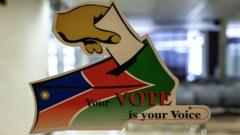In an unprecedented wave of electoral change across sub-Saharan Africa, voters are turning against long-established governing parties, with many facing major setbacks in recent elections. Escalating public discontent over economic mishandling and corruption has bolstered the effectiveness of opposition coalitions, creating a climate ripe for political transformation.
Shifts in Power: Voter Discontent Reshapes African Politics

Shifts in Power: Voter Discontent Reshapes African Politics
The tides of governance in sub-Saharan Africa are shifting as voters express growing frustration with incumbent parties, leading to significant electoral losses for once-dominant governments.
In a year marked by significant electoral shifts, sub-Saharan Africa has witnessed a striking trend: an escalating discontent with entrenched governing parties. Namibian President Netumbo Nandi-Ndaitwah, candidate of the ruling Swapo party which has been in power for over three decades, retained her position with 57% of the vote, despite losing parliamentary seats. This anomaly reflects broader disarray among governing parties across the region, who are grappling with a surge in voter dissatisfaction.
Recent elections in countries such as Botswana and Mauritius revealed a stark voter backlash, leading to unexpected defeats for historically dominant parties. The Botswana Democratic Party (BDP) faced a crushing defeat, reducing its parliamentary representation to a mere four seats, while the governing coalition in Mauritius was similarly decimated, capturing only 27% of the vote.
The political landscape of sub-Saharan Africa is further illuminated through electoral outcomes in Senegal and the self-declared republic of Somaliland, where opposition victories marked significant turns in governance. In Senegal, the release of imprisoned opposition leaders was a pivotal moment leading to a decisive win against the ruling party, highlighting an emerging trend of transforming public sentiment towards accountability and transparency.
Even in nations where ruling parties have managed to cling to power, such as South Africa, the grip has loosened. The African National Congress (ANC) barely secured a majority, necessitating a coalition government, a profound shift from their previous dominance since the end of apartheid.
Several key factors have converged to create an environment hostile to incumbents; these include economic stagnation, increasing public demand for character-driven governance, and the emergence of organized opposition movements. In Kenya, protests fueled by economic grievances compelled the government to reckon with its widespread unpopularity.
As with trends observed globally, voter discontent over economic issues has stirred reactions across various democracies, demonstrating a pattern of accountability enforcement that resonates beyond African borders. However, the recent surge in opposition momentum in Africa is notable due to its unique context, suggesting a resilience that merits attention from international democracy advocates.
With upcoming elections, such as those in Ghana, signaling potential for further shifts, a historical precedent is being formed: 2024 might just become a hallmark year for the opposition in sub-Saharan Africa. This wave of activism and dissent against corruption and mismanagement reflects a burgeoning appetite for democratic engagement that challenges prior assumptions about the region's political immutability.
As this narrative unfolds, it becomes clear that Africa may not only be rebounding from strife but is also carving out a path toward enhanced democratic accountability that could influence global governance trends in the years to come.
Recent elections in countries such as Botswana and Mauritius revealed a stark voter backlash, leading to unexpected defeats for historically dominant parties. The Botswana Democratic Party (BDP) faced a crushing defeat, reducing its parliamentary representation to a mere four seats, while the governing coalition in Mauritius was similarly decimated, capturing only 27% of the vote.
The political landscape of sub-Saharan Africa is further illuminated through electoral outcomes in Senegal and the self-declared republic of Somaliland, where opposition victories marked significant turns in governance. In Senegal, the release of imprisoned opposition leaders was a pivotal moment leading to a decisive win against the ruling party, highlighting an emerging trend of transforming public sentiment towards accountability and transparency.
Even in nations where ruling parties have managed to cling to power, such as South Africa, the grip has loosened. The African National Congress (ANC) barely secured a majority, necessitating a coalition government, a profound shift from their previous dominance since the end of apartheid.
Several key factors have converged to create an environment hostile to incumbents; these include economic stagnation, increasing public demand for character-driven governance, and the emergence of organized opposition movements. In Kenya, protests fueled by economic grievances compelled the government to reckon with its widespread unpopularity.
As with trends observed globally, voter discontent over economic issues has stirred reactions across various democracies, demonstrating a pattern of accountability enforcement that resonates beyond African borders. However, the recent surge in opposition momentum in Africa is notable due to its unique context, suggesting a resilience that merits attention from international democracy advocates.
With upcoming elections, such as those in Ghana, signaling potential for further shifts, a historical precedent is being formed: 2024 might just become a hallmark year for the opposition in sub-Saharan Africa. This wave of activism and dissent against corruption and mismanagement reflects a burgeoning appetite for democratic engagement that challenges prior assumptions about the region's political immutability.
As this narrative unfolds, it becomes clear that Africa may not only be rebounding from strife but is also carving out a path toward enhanced democratic accountability that could influence global governance trends in the years to come.


















